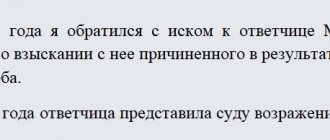To effectively protect their rights and interests, the defendant must always take an active position in court. The legislation establishes equality of parties in the arbitration process and provides the defendant with many means of protection. A counterclaim is one of them!
According to the law, you can protect your rights in one of the following ways:
- provide reasoned objections,
- file a counterclaim,
- file a separate claim,
- declare a suspension of consideration of the claim until a decision is made in another case,
- conclude a settlement agreement.
Everything depends on the presence or absence of the defendant’s own claims to the plaintiff, on the nature of these claims, and on the goals of the participant in the process.
If the defendant has not only objections to the plaintiff’s statement, but also his own claims against him, then he has the right to file a counterclaim.
We will draw up a statement of claim to the court in 3 days
- Competently; - To any court; — If desired, the service is provided online.
Application for a claim
What is a counterclaim?
A counterclaim is a document containing claims made by the defendant to the plaintiff's allegations.
It is considered one of the ways to protect the second party in civil proceedings. A document is required if the defendant has claims against the plaintiff. A claim is filed at a time when the case has already been initiated.
Counterclaims can be submitted at any time during the consideration of the case. But this must be done before a decision is made. It is better to file a counterclaim at the preparatory stage.
When are counterclaims not accepted?
The law does not provide for the possibility of consolidating claims and examining counterclaims in cases involving the return of a child to the other parent after divorce. The court has a similar attitude to cases regarding the implementation of access rights.
There are a couple of major exceptions to the above rule. Firstly, the case will be considered when the demands for the return of more than one child are combined if the children were brought into the country or are being held on its territory without the existence of legal circumstances.
Secondly, the court will take into account the case of consolidation of claims affecting access rights in relation to more than one child if there are grounds for this, provided for by an international treaty of the Russian Federation.
Filing a claim
The application is drawn up and sent in accordance with the requirements reflected in Articles 131, 2, 137 of the Code of Civil Procedure of the Russian Federation.
But there are also special conditions for paper processing. Based on the norms reflected in Articles 410 and 411 of the Civil Code of the Russian Federation, the claims of the claim will not be accepted if:
- there is a statute of limitations on the claim that has already expired;
- the application specifies the conditions for compensation for harm caused to the citizen;
- there is a need to collect alimony;
- conditions of lifelong imprisonment are prescribed.
Reference!
The appeal must be filed in the same court in which the original claim is being heard. The claim must contain introductory, motivational, pleading and final parts.
You need to write in it:
- name of the judicial authority;
- surname, name, patronymic of the defendant submitting the application;
- surname, name, patronymic of the plaintiff against whom the claim is being filed;
- the price of the statement of claim;
- civil case number;
- subject of the claim;
- grounds for going to court;
- the claims made by the plaintiff;
- response demands;
- list of documents attached to the claim;
- date of document preparation;
- defendant's signature.
The text must be constructed in compliance with the principles of consistency, conciseness, and clarity. The application may be submitted in paper form to the court office. It is also possible to submit an electronic appeal.
Predetermining circumstances of choice
If the defendant, defending against claims, refers to the lack of any right of the plaintiff, and not to the existence of his own, then an objection is used as a remedy. Thus, when responding regarding penalties under an agreement that is considered, in the opinion of the involved party, to be a void transaction, it is not necessary to express your claims in the form of a statement. When considering cases involving a void transaction, it is the court's responsibility to evaluate the defendant's relevant arguments. In this case, the plaintiff must refute them. Thus, those circumstances that relate to the nullity of the transaction are included in the subject of proof. It does not matter how they are formulated - as objections or as a counterclaim in the arbitration process.
An example of using the right to ask for an award in favor of the defendant of something (money, real estate, etc.) is often used in practice. This happens when the involved party declares the contract invalid. If the transaction is contestable, then the claim must be presented as a counterclaim. Otherwise, the defendant’s arguments should not be assessed on their merits. This means that the plaintiff does not need to refute them. The defendant may also refer to any right that allows him to request recognition or non-existence of certain legal relations between him and the other party. In this case, both an objection and a counterclaim in the arbitration process can act as ways to refute the claims.
Mistakes when preparing a claim
When a defendant files a counterclaim, it is important to comply with applicable laws.
If this rule is not followed, the citizen will not be able to object to the original claim. The following mistakes are often made when filling out an application.
- A citizen files a claim without reflecting its connection with a document already in court. In accordance with Article 138 of the Code of Civil Procedure of the Russian Federation, there will be no grounds for accepting the application.
- The defendants violate the requirements for the form and content of the counterclaim. They do not indicate a list of attached documents or do not attach the papers themselves. The application may also be submitted incorrectly.
- The defendant has grounds to assert his own claims. But he must do this in a separate, not counterclaim.
- The defendant files a lawsuit to delay the process of studying the case on its merits. In this case, there is an abuse of procedural law.
State duty amount
When filing a counterclaim, you must transfer the state fee to the budget. Its value is determined by Art. 333.21 of the Tax Code and depends on the monetary value of the claims presented.
Filing a counterclaim requires payment of a state fee
Table. Amount of state duty for filing a counterclaim
| Cost of claim, rub. | State duty amount |
| Does not exceed 100,000 | % of the amount of claims, but not less than 2,000 rubles. |
| From 100,001 to 200,000 | 3,000 rub. + 3% of the amount exceeding RUB 100,000. |
| From 200 0001 to 1 000 000 | 7,000 rub. + 2% of the amount exceeding RUB 200,000. |
| From 1,000,001 to 2,000,000 | 23,000 rub. + 1% of the amount exceeding RUB 1,000,000. |
| More than 2,000,000 | 33,000 rub. + 0.5% of the amount exceeding RUB 2,000,000, but not more than RUB 200,000 in total |
The receipt form for payment of the state duty can be downloaded
.
Filing a claim
The filing of a counterclaim is carried out according to standard, legally prescribed rules.
If they are violated, then the consequences will be similar to the incorrect filing of the initial claim. If legal regulations are not followed, then:
- the application may be terminated;
- the document can be transferred back to the applicant;
- This claim may be rejected.
Counterclaims are subject to general rules regarding jurisdiction. But they must be related to the original claims.
Filing a counterclaim is possible to offset the original claim. However, the defendant has the right to prepare an objection. This is allowed if the response demand does not exceed the original one. In other cases, a counterclaim is sent.
What documents should I attach to the application?
The list of attached documents may vary depending on the circumstances of a particular case and the provisions of current legislation. Please clarify this point individually immediately before going to court. In general, the court requires that the following be attached to the counterclaim:
- its copies according to the number of recipients;
- power of attorney for a representative if he is involved in the case;
- receipt of payment of state duty;
- documents on the basis of which the applicant puts forward his demands (if any) and their copies;
- calculation of the cost of a claim when considering a case involving various types of property proceedings.
Additional documents may also be attached if required by the individual characteristics of the dispute being resolved.
Documents when filing a claim
When submitting a counterclaim, it is necessary not only to follow the procedure.
The defendant must have a complete set of documents. It must be collected in advance so that the court will consider the appeal in a timely manner and will not submit the package for addition or correction. Along with the claim, the following should be sent to the court:
- copy of passport;
- evidence in the form of documents indicating that the defendant is right;
- other documents related to the process;
- a receipt confirming the fact of payment of the state fee;
- documents of citizens involved in the process (witnesses, experts).
What happens next
Within five days from the date of filing the claim, the judge alone makes a decision on whether it should be accepted for proceedings and the case should be initiated or not. If everything is in order with the application, then after the expiration of the five-day period it is accepted.
After this, preparation for the trial begins. Its duration is determined in each case individually. However, it should not exceed the total period for consideration of the case, which is three months, being within its framework.
When the preparation is completed, the judge sets the date and time of the hearing by issuing a ruling, which is sent to the parties and interested parties.
The counterclaim is considered in court
Based on the results of the meeting, after listening to the arguments of the parties and studying the evidence presented by them, the judge, in the name of the Russian Federation, makes a decision on the merits of the case under consideration. Typically, the solution can be of three types:
- fully satisfy the requirements;
- partially satisfy the requirements;
- refuse satisfaction.
If the result of the consideration of the case is not satisfactory, the decision can be appealed within one month from the date of its adoption. The complaint is sent to the arbitration court, which is authorized to consider appeals. The Federal Law “On Arbitration Courts in the Russian Federation” classifies district courts as such courts.
Acceptance of claim
In accordance with Article 138 of the Code of Civil Procedure of the Russian Federation, there are several conditions, subject to which a counterclaim can be accepted.
- A response document can only be sent in opposition to the original one.
- Only one claim can be satisfied: counterclaim or original. Partial or full satisfaction is allowed.
- The claims are interconnected. Only with their comprehensive consideration can the dispute be resolved effectively. The judge considers both statements when making a decision.
- A claim that makes it impossible to satisfy the original claim is accepted for consideration. If the above conditions are not met, the judge has the right to refuse to accept the document. It will not be possible to appeal the decision.
The court has the right to independently determine whether to accept the claim or not. With additional demands, the process becomes more complicated. It is necessary to examine a large volume of circumstances of the case and evidence. Therefore, unless a direct connection between both claims is proven, the second one will not be accepted.
When to serve
In the court of first instance, a counterclaim can be filed before the court retires to the deliberation room (Article 137 of the Code of Civil Procedure of the Russian Federation) - in fact, at any time during the process, until the final decision is made.
In the appeal procedure, the defendant has the right to present demands only if the court proceeded to consider the case according to the rules of the first instance (Part 6 of Article 327 of the Code of Civil Procedure of the Russian Federation, position of the Supreme Court of the Russian Federation).
Lawyers recommend filing a counter-statement to the statement of claim as early as possible, preferably at the stage of preparing the case for trial (this is the very first court hearing). Otherwise, the consideration of the dispute may be delayed. In particular, the judge has the right to postpone the proceedings in order to provide the parties with time to prepare, taking into account the presentation of new demands and the disclosure of circumstances in the case (Part 1 of Article 169 of the Code of Civil Procedure of the Russian Federation, paragraph 10 of the Resolution of the Plenum of the Supreme Court of the Russian Federation No. 13 of June 26, 2008).
Leaving without consideration or termination of proceedings
These cases should be considered in a special order. In judicial practice, it often happens that leaving the initial claim without consideration extends to the counterclaim or the proceedings are terminated. The executive body refers to the “jointness” of the proceedings. In other words, the court justifies its actions by the direct connection of the two claims. However, despite the fact that the counterclaim has its own specifics, it belongs to the types of statements that are provided for by the APC. Therefore, it is subject to existing general rules. In particular, in order to leave without consideration or terminate the proceedings, the conditions given in Art. 85, 87. In their absence, these actions cannot be considered lawful. In this regard, the acceptance of a counterclaim imposes obligations on the court to make a decision both on it and on the original claim. If these conditions are not met, the response of the executive body cannot be considered exhaustive, since it avoided considering the defendant’s claims.
How to submit?
The defendant's appeal is drawn up in the form of a separate document. To do this, you need to pay a fee. The court decides whether the counterclaim will be accepted for consideration as part of the ongoing process. If a positive decision is made, then the other party is given time to familiarize itself with the requirements, after which the process continues. The plaintiff presents his position regarding the claims made: whether he recognizes their legality or not.
The defendant has the right to change the stated claims, reduce or increase the cost of the claim, and waive part of the claims. If the dispute affects new participants, it will have to be divided into 2 independent processes.
Only the defendant can write a counter-statement. The claims in the document must relate solely to the plaintiff. Third parties and witnesses cannot protect their interests in this way.
When can the application be returned or left without progress?
There are a number of circumstances on the basis of which a counterclaim may be rejected by the court, namely:
- the applicant filed a claim without complying with established legal norms or did not submit the necessary documents predetermining the validity of the claim;
- the powers of the court do not extend to cases of this category;
- the claim is not signed, is drawn up with errors, etc.
In general, each case is considered individually and the list of grounds sufficient to reject a claim can expand significantly. In any circumstances, the judge, when returning the claim, gives a reasoned explanation, pointing out errors and providing recommendations for further actions (eliminating obstacles, choosing a suitable court, etc.).
If, during the examination of the case, the judge determines that the application submitted by the defendant was drawn up and presented to the court in violation of the requirements of the relevant articles of the Code of Civil Procedure, the claim will not receive motion. The applicant will be sent a corresponding notification indicating the time frame for correcting the identified deficiencies.
If the applicant eliminates the shortcomings indicated by the judge within the established period, the application will be accepted. Otherwise, the plaintiff receives the application and accompanying documents back, and the case itself is not accepted for study.
If the court decides to leave the response statement of claim without progress, the applicant, considering it necessary, can challenge such a decision by filing an appropriate appeal.
Filing a counterclaim is the legal right of every defendant
Thus, filing a counterclaim is the legal right of every defendant. In this kind of statement, you can express your disagreement with the provisions of the original claim and change the outcome of the case if there are weighty and sufficient reasons for this.
Video – Counterclaim of the Code of Civil Procedure
A special type of defense for the defendant is a counterclaim.
In a civil case already initiated in court, the defendant files his claim against the plaintiff. An important condition for accepting a counterclaim is that the counterclaims must be related to the original ones. And will lead to the refusal to satisfy the demands of the original plaintiff. They must also be declared on similar grounds.
A counterclaim allows you to quickly and, importantly, objectively consider the dispute between the parties in court. As a sample of a counterclaim, you can take any statement of claim (for termination of a contract, for declaring a transaction invalid, etc.), in which you indicate that it has been filed specifically as a counterclaim.
Counterclaim
Example of a counterclaim
COUNTERCLAIM
I believe that the plaintiff’s demands are not justified and cannot be satisfied, since the house at the address: Minusinsk, st.
Aloe, house 335 was purchased by us during the marriage using jointly acquired funds. It is the joint property of the spouses.
The house was registered only in the name of A.P. Sergeeva, since at the time of purchase I was working on a rotational basis and could not be present at the conclusion of the transaction. I did not renounce my rights to joint property, I did not previously declare my rights, since there were no obstacles to living on the part of the plaintiff.
When reviewing the claims for eviction, I want to file a counterclaim for the division of property after a divorce - a residential building at the address: Minusinsk, st. Aloe, house 335 - and recognition of my ownership of ½ share in the right to this house.
Since satisfying the counterclaim will completely exclude the satisfaction of the original claim, there is a mutual connection between the counterclaim and the original claim and their joint consideration will lead to a faster and more correct consideration of the dispute, I consider it necessary to state my claims in the form of a counterclaim.
- Accept the counterclaim of Ivan Alekseevich Sergeev against Alevtina Petrovna Sergeeva for the division of property jointly acquired by the spouses, namely a residential building at the address: Minusinsk, st. Aloe, house No. 335, and recognize Sergeev I.A. ownership of a ½ share in the ownership of a residential building at the address: Minusinsk, st. Aloe, house 335, recognize A.P. Sergeeva ownership of a ½ share in the ownership of a residential building at the address: Minusinsk, st. Aloe, house 335
Recommendations for preparing a statement of claim
You can obtain an example of a statement of claim in the office or at the court information stand. In general, the procedure for filing a counterclaim is similar to the composition of the initial application. The document must necessarily reflect the following information:
- personal data of both parties to the case;
- the cost of the claim, if the case under consideration concerns various types of property disputes;
- civil case number;
- key grounds and essence of counterclaims;
- the meaning of the plaintiff's initial demands;
- list of attached documents;
- date, signature.
Commentary on Article 138 of the Code of Civil Procedure of the Russian Federation
1. A counterclaim is accepted by the court (at least one of the conditions must be present) if:
1) the counterclaim is aimed at offsetting the original claim. Set-off is understood here as the basis for the termination of counter-similar claims (Article 410 of the Civil Code). That is why the counterclaim, which is in the nature of a unilateral expression of will, in this case is organically consistent with the civil law nature of the offset, for which, in accordance with Art. 410 of the Civil Code, a statement from one party is sufficient. However, there is one significant difference: if, in an out-of-court statement about the offset of counterclaims of the same type, the party making such a statement acknowledges the existence of its debt to the counterparty (i.e., the legal validity of the obligation being set off), then when filing a counterclaim, there is no “automatic” recognition of the original no claim occurs. This fundamental difference allows us to draw an important substantive conclusion: the very filing of a counterclaim (filing a counterclaim) is not the basis for terminating the counter-obligations of the parties. Counter-obligations (subject to their substantive validity) continue to exist during the trial and will be terminated only on the basis of a judicial act that has entered into legal force. Consequently, even filing a counterclaim on the grounds of paragraph. 2 of the commented article does not prevent the defendant (until the adoption of a judicial act that ends the consideration of the case) from making the usual offset in accordance with Art. 410 GK. In this case (subject to the substantive validity of the counterclaims), the court will simply have to reject the claims - both the original and the counterclaim (in the amount of the offset made).
Unfortunately, there is no practice of the Supreme Court of the Russian Federation that would confirm (or, on the contrary, refute) this conclusion. At the same time, the Presidium of the Supreme Arbitration Court of the Russian Federation takes the opposite position on this issue: “An obligation cannot be terminated by offsetting a counterclaim of the same type, the term of which has come after the filing of a claim against the person who has the right to declare an offset. In this case, offset may be made when considering the counterclaim.” <1>. We believe that this conclusion is hardly valid. Firstly, the procedural legislation that regulates the institution of counterclaims does not contain any restrictions regarding the possibility of terminating civil obligations. Secondly, there are no indications of the inadmissibility of offset in a counterclaim and in substantive legislation (Article 411 of the Civil Code). And thirdly, in the absence of a direct indication in the law, it would be completely unacceptable to limit the application of substantive legal institutions (in particular, the institution of termination of obligations) by reference to the existence of any procedural institutions.
——————————— <1> Clause 1 of the information letter of the Presidium of the Supreme Arbitration Court of the Russian Federation dated December 29, 2001 N 65 “Review of the practice of resolving disputes related to the termination of obligations by offsetting counter-similar claims” (HAC RF. 2002. N 3).
Should the court, when accepting a counterclaim on the grounds of paragraph. 2 of the commented article to check the existence of the conditions for offset established by civil law, namely the reciprocity, urgency and homogeneity of obligations? Must he take into account the limitations imposed by substantive law on offset? What should he do in cases where, after accepting a counterclaim, it turns out that counterobligations exist, but the offset itself is impossible under the current civil law?
The current Code of Civil Procedure does not contain a direct answer to these questions. At the same time, based on the goals and objectives of the stage of initiating a case, the following approach can be formulated. Since the legislator mentions the “direction” to set-off, the court, when accepting a counterclaim, without going into clarification of the issue of the legal validity of the counter-obligations, must check the documents available in the case and additionally submitted by the plaintiff in the counterclaim for their counter-claim, urgency and homogeneity. A different approach would mean the absolute freedom of the defendant in the original claim to initiate the filing as a counterclaim of any claim, the claims for which obviously cannot be set off with the claims for the original claim.
As for the restrictions established by substantive legislation for offset, it is necessary to proceed from whether such restrictions are purely substantive or they are associated with a limitation of the right to bring a claim.
In the first case, the court is obliged to initiate proceedings on a counterclaim. For example, if the parties to the agreement expressly provided for the inadmissibility of offset (Article 411 of the Civil Code), the court must consider the stated counterclaim on its merits, while assessing the legal validity of such an agreement, but in no way return the counterclaim on the grounds of the lack of grounds established by paragraph. 2 commented articles. The return of the counterclaim in this case would mean that the court, at the stage of initiating the case, resolves issues related to the essence of the substantive legal dispute, which obviously contradicts the goals and objectives of this stage.
In the second case, the court is obliged to refuse to accept the statement of claim (see commentary to Article 134 of the Code of Civil Procedure). For example, in accordance with the general rule of Art. 1062 of the Civil Code, claims of citizens and legal entities related to the organization of games and betting or participation in them are not subject to judicial protection. Therefore, if the counterclaim arises from an obligation arising from the bet, the court will be obliged to refuse to accept the statement of claim.
The same should be done in cases where, after accepting a counterclaim, it turns out that counterobligations exist, but the offset itself is impossible under the current civil law. If the impossibility of offset is caused solely by substantive grounds, the counterclaim case must be considered on its merits. If material and legal obstacles involve a limitation of the right to bring a claim, the court will be obliged to terminate the proceedings;
2) satisfaction of the counterclaim excludes, in whole or in part, satisfaction of the original claim. This procedural formula allows the defendant in the original claim, using the construction of a claim for recognition or a transformative claim, to essentially level out the legal grounds of the original claim.
Most often, defendants in the initial claim make counterclaims for: a) recognition of contracts as invalid or unconcluded (in the case where the plaintiff makes demands for collection of debt arising from the contract, or declares his rights to the disputed property on grounds arising from the contract); b) invalidation of the order issued to the plaintiff (when filing a claim for eviction); c) recognition of ownership or compulsion to enter into an agreement (when the plaintiff files a vindication claim - a claim for reclaiming a specific thing or when filing a claim for eviction); d) termination of the contract (if the plaintiff presents demands for an obligation to transfer the thing in kind or to fulfill another contractual obligation).
The filing of counterclaims of this kind is based on a substantive counterclaim. However, it is quite possible that the defendant in the initial claim, filing a counterclaim to challenge a civil contract, has the ultimate goal of challenging the very procedural right of the plaintiff in the initial claim to go to court. Thus, in one of the cases in which the claim was filed by the trustee, the defendant filed a counterclaim to invalidate the trust agreement itself <1>;
——————————— <1> See: Resolution of the Presidium of the Supreme Arbitration Court of the Russian Federation dated April 17, 2001 N 2554/99 // Supreme Court of the Russian Federation. 2001. N 8.
3) there is a mutual connection between the counterclaim and the initial claim and their joint consideration will lead to a faster and more correct consideration of the case. This condition is focused on judicial discretion, since the absence of clear criteria for “mutual connection” allows the court to accept any other claim as a counterclaim.
2. The current Code of Civil Procedure does not contain a rule regulating subsequent (after the filing of a counterclaim) actions of the court. We believe that such actions of the court (including their procedural design) should be similar to the actions taken by the court after accepting a regular statement of claim. In other words, the court is obliged to apply the rules on accepting a statement of claim (Article 133 of the Code of Civil Procedure), refusing to accept it (Article 134 of the Code of Civil Procedure), returning the statement of claim (Article 135 of the Code of Civil Procedure) and leaving it without movement (Article 136 of the Code of Civil Procedure). However, such an approach does not answer a very important question: what should the court do in the absence of the conditions for acceptance established in paragraph. 2 - 4 commented articles? What judicial act is issued in this case? What legal consequences does it give rise to?
A similar rule in the APC prescribes in this case to make a ruling on the return of the counterclaim (Part 4 of Article 132). The Plenum of the Supreme Court of the Russian Federation mentions the refusal to accept the counterclaim <1>.
——————————— <1> See paragraph 6 of the Resolution of the Plenum of the Supreme Court of the Russian Federation “On the preparation of civil cases for trial.”
We believe that the institution of refusal to accept is not applicable here in principle, since according to the current Civil Procedure Code, refusal to accept a statement of claim is associated with the lack of the right to file a claim or with the presence of a judicial act on an identical claim and prevents the applicant from re-applying to the court with an identical claim (Part. 3 Article 134 Code of Civil Procedure).
Is the analogy of procedural law acceptable in this case, i.e. application of Part 4 of Art. 132 APK? We believe that the indication in Part 4 of Art. 132 of the APC on the need (in the absence of conditions for acceptance) to make a determination on return is essentially correct. However, the following must be taken into account here.
If the conditions of acceptance established in paragraph. 2 - 4 of the commented article are missing and the case is not within the jurisdiction of this court, the counterclaim must be unconditionally returned on the grounds of clause 2 of part 1 of Art. 135 Code of Civil Procedure. At the same time, the return of the counterclaim does not prevent the filing of an identical counterclaim (for example, it is possible that if the plaintiff changes the subject of the original claim, the filing of a counterclaim will satisfy one of the conditions of paragraph 2 - 4 of the commented article) or the filing of an ordinary claim for consideration within the framework of an independent affairs.
Meanwhile, such an approach would be incorrect in principle in cases where the conditions of acceptance established in paragraph. 2 - 4 of the commented article are missing, but the counterclaim itself was filed in compliance with the general rules for filing claims, and at the same time, the claim is subject to the jurisdiction of the court that received the counterclaim, regardless of the rule established by Part 2 of Art. 31 Code of Civil Procedure. In such a situation, the return of the counterclaim (as well as the refusal to accept) would not only violate the right to judicial protection, but could also create obstacles to the protection of the rights of the person who previously filed the counterclaim (for example, if the counterclaim was filed within the time limit for the claim). statute of limitations, and the determination on his return was made outside of it, then when filing a new statement of claim, the defendant has a strong counterargument - a statement about the application of the limitation period, which he would not have had if independent proceedings had been initiated on the basis of a counterclaim). Therefore, we believe that the court should make a ruling on the acceptance of the statement of claim (which will entail the initiation of independent proceedings - separate from the proceedings on the original claim).
3. Determinations to refuse acceptance and to return a counterclaim may be the subject of an independent appeal, which follows from Part 3 of Art. 134 and part 3 of Art. 135 Code of Civil Procedure.
We also believe that the object of an independent appeal may include rulings on the return of a counterclaim based on the absence of the conditions established in paragraph. 2 - 4 commented articles. This is explained by the fact that the filing of a counterclaim is made according to the general rules for filing claims, and Part 3 of Art. 135 of the Code of Civil Procedure directly provides for the right to appeal a ruling to return a statement of claim. In addition, the current Code of Civil Procedure provides for the right to appeal those determinations that exclude the possibility of further progress of the case (Clause 2, Part 1, Article 371 of the Code of Civil Procedure). It seems that in relation to the institution of a counterclaim, a determination on its return should be considered as blocking the further progress of the case (in this case, the case should be understood as the proceedings that should have been initiated on the basis of the counterclaim). The fact that the defendant in the original claim, when returning the counterclaim, is not deprived of the right to bring an ordinary claim, should not be important for resolving the issue of the possibility of appeal: the subjective right to initiate a new case does not affect the preclusive nature of the determination to return the counterclaim.
4. What should the court do if by the time the appeal against the ruling on the return of the counterclaim (ruling on refusal to accept the counterclaim) is considered, the proceedings in the court of first instance on the original claim have been completed (i.e., a court decision has been made, a ruling on abandoning the claim without consideration or a determination to terminate the proceedings)?
We believe that the following approaches can be formulated here:
1) if, after completion of the proceedings in the court of first instance on the initial claim, a higher court, resolving the issue of the legality and validity of the issued ruling on return (ruling on refusal to accept a counterclaim), establishes that there were no grounds for return (refusal) and a counterclaim regardless of the rule established by Part 2 of Art. 31 of the Code of Civil Procedure, is subject to the jurisdiction of the court that received the counterclaim, this determination should be canceled and the counterclaim should be sent as an ordinary statement of claim for consideration by the court of first instance.
In this case, one of the main provisions of the civil process is observed: if the statement of claim is filed in compliance with all formal requirements (including the rule of jurisdiction), proceedings on it must be initiated. Accordingly, the person who filed the counterclaim will not need to file a new identical statement of claim. The decision on the initial claim can be appealed independently;
2) if, after completion of the proceedings in the court of first instance on the initial claim, the higher court, resolving the issue of the legality and validity of the ruling to refuse to accept the counterclaim, establishes that there were no grounds for refusal and the counterclaim is subject to the jurisdiction of the court that received the counterclaim statement of claim solely on the grounds of Part 2 of Art. 31 of the Code of Civil Procedure, this ruling should be canceled and a ruling should be made to return the statement of claim on the grounds of clause 2, part 1, art. 135 Civil Procedure Code;
3) if, after completion of the proceedings in the court of first instance on the initial claim, the higher court, resolving the issue of the legality and validity of the ruling on the return of the counterclaim, establishes that there were no grounds for return and the counterclaim is within the jurisdiction of the court that received the counterclaim solely on the grounds of Part 2 of Art. 31 of the Code of Civil Procedure, this definition should be changed, indicating as the basis for returning clause 2, part 1 of Art. 135 Code of Civil Procedure.
At the same time, we believe that when checking the legality and validity of a determination to return a counterclaim (a determination to refuse to accept a counterclaim), the cassation instance in any case does not have the right to avoid checking the presence (absence) of the conditions established in paragraph. 2 - 4 commented articles. Such a check is necessary to ensure real protection of the procedural rights of the defendant in the original claim, who, when appealing the decision on such a claim, will be able to reasonably refer (as one of the grounds for cancellation) to a procedural violation - the unjustified return of the counterclaim or refusal to accept it.
5. Termination of proceedings on the initial claim or leaving it without consideration does not entail corresponding legal consequences for the counterclaim - it must be considered even though the conditions provided for in paragraph. 2 - 4 commented articles. This conclusion follows from the fact that the Civil Procedure Code does not provide for the possibility of terminating proceedings on a counterclaim or leaving it without consideration in connection with the commission of similar procedural actions on the original claim.
The court’s obligation to consider a counterclaim remains the same if, with the termination of proceedings on the original claim or leaving it without consideration, the counterclaim becomes beyond the jurisdiction of this court. In this situation, there are no grounds for transferring the case to another court, since at the time the counterclaim was accepted, there were no violations of the rules of jurisdiction (and, therefore, clause 3 of part 2 of article 33 of the Code of Civil Procedure is inapplicable), and part 1 of art. 33 of the Code of Civil Procedure directly establishes that a case accepted by a court for its proceedings in compliance with the rules of jurisdiction must be resolved by it on its merits, even if in the future it becomes subject to the jurisdiction of another court.
A change by the plaintiff in a counterclaim of the basis or subject of the counterclaim also does not have a special impact on the procedural legal relationship: both claims must be considered on their merits.







